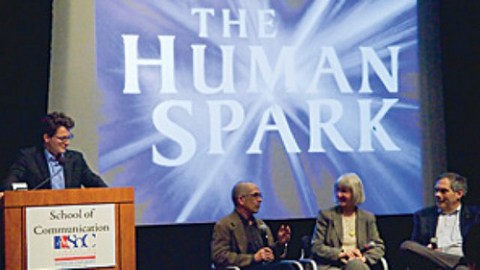Panel Discusses The Human Spark and the Nature of Science

Last week I had the opportunity to moderate a world-class panel here on campus featuring AU film professor Larry Engel, science education advocate Eugenie Scott, and National Academies science education expert Jay Labov. The evening started with a screening of a segment from the PBS Series The Human Spark, directed by Engel and recipient of the AAAS science journalism prize for television.
We then gathered on stage for a world-class discussion featuring the knowledge, experience, and wisdom of Engel, Scott, and Labov. Video of the panel should be available next week, in the meantime, Mike Unger, one of our top communication students at American, wrote a terrific web story on the event. Here’s an excerpt:
Led by SOC professor Matthew Nisbet, the discussion, cosponsored by SOC and the College of Arts and Sciences, touched on several issues surrounding the series and the state of science today.
Scott has been fighting the teaching of creationism and other religiously based views in science classes for years. Often, she said, science is beside the point.
“There are a lot of people who don’t like the idea that they share common ancestors with apes,” she said. “Many scientists are people of faith, many are not. It doesn’t matter because we’re all trying to explain the natural world.”
Often the public does not comprehend the very nature of science, Labov said.
“Science is simultaneously reliable and able to change,” he said. “We need to help people understand that’s the nature of science. We have to help people to understand that we don’t always have the definitive answer.”
The Human Spark provides some answers, but raises many more questions. That’s one of its many strengths.
“For most of my career I’ve heard, ‘you have to dumb it down,’” Engel said. “What I’m trying to do is distill so [scientists] can convey the information and engage the various audiences into thinking about the contexts. I don’t think documentary is a vehicle for facts, it’s a vehicle for narrative.”





